Olive Egger Chicken Breed: The Ultimate Guide
Back to blog
The Olive Egger chicken breed, with their stunning plumage and unique egg colors, have taken the poultry world by storm. These charming birds are the result of a fascinating crossbreeding journey, combining the best traits of various heritage breeds. Join us as we explore the origins, characteristics, and care of Olive Eggers, uncovering the secrets of their olive-green eggs and endearing personalities. Whether you're considering adding Olive Eggers to your flock or simply want to deepen your knowledge about these enchanting chickens, this blog is your go-to resource.

History of the Olive Egger chicken breed
The history of Olive Egger chickens is a tale of innovative crossbreeding and a quest for unique egg colors. The term "Olive Egger" refers to a hybrid chicken breed that is specifically bred to lay eggs in various shades of olive or moss green. While Olive Eggers are not recognized as a standardized breed by the American Poultry Association, they have gained significant popularity among backyard chicken keepers and breeders.
Olive Eggers originated in the early 20th century through crossbreeding of heritage chicken breeds. Breeders aimed to produce greenish-hued eggs by selectively breeding chickens with blue and dark brown egg-laying traits from breeds like Araucana, Ameraucana, and Marans.
Through careful and strategic mating, breeders were able to produce offspring that inherited genes for both blue and dark brown egg-laying. The resulting hens, known as Olive Eggers, would then lay eggs with various shades of olive green. It's important to note that not all Olive Eggers will lay the exact same shade of green, as the color can vary depending on the specific genetics inherited from their parent breeds.
My Pet Chicken offer these Olive Egger chickens for sale.
The personality of an Olive Egger chicken
Olive Egger chickens are known for their delightful and endearing personalities. While individual temperament can vary, they generally exhibit traits that make them a joy to have in a flock.
These chickens are often described as friendly and curious, showing a great deal of interest in their surroundings and the people who care for them. They are known to be quite sociable, often seeking interaction with their human caretakers. Olive Eggers are generally docile and calm, making them suitable for families and backyard flocks.
Unlike some more flighty or nervous breeds, Olive Eggers tend to be relatively calm and easygoing. They are known to be good foragers, enjoying their time exploring the yard or pasture. However, they are also content in confinement and can adapt well to a smaller coop or run.
Olive Eggers are typically not aggressive and get along well with other chickens. They generally integrate smoothly into a mixed flock, forming strong bonds with their flock mates. They are not typically at the top of the pecking order, but they can hold their own and establish their place within the hierarchy.
Overall, Olive Eggers make wonderful additions to a backyard flock due to their friendly and easygoing nature. Their engaging personalities and calm demeanor make them delightful companions, whether you're a seasoned chicken keeper or new to raising poultry.
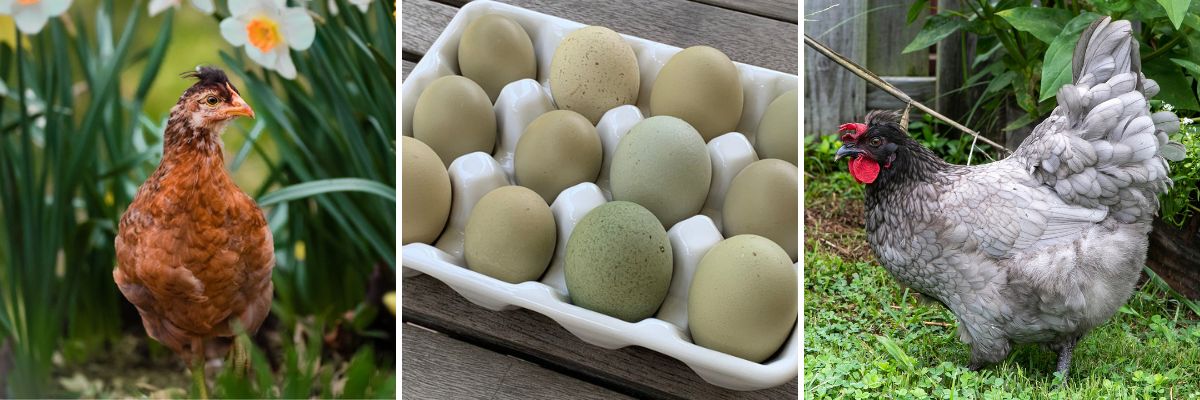
The appearance of Olive Egger chickens
Olive Egger chickens display a diverse and captivating array of appearances due to their mixed heritage. Their appearance can vary significantly depending on the specific parent breeds involved in their crossbreeding. However, there are some general characteristics that are often observed in Olive Eggers.
The plumage of Olive Eggers can be quite striking and varied. They may exhibit a wide range of colors, patterns, and feather textures. Some Olive Eggers may have smooth, while others may have frizzle plumage.
Olive Eggers often display a mixture of earthy tones such as browns, grays, and blacks in their feathers, creating a beautiful appearance. They may also exhibit speckling, mottling, or other unique patterns, adding to their visual appeal.
The appearance of an Olive Egger can vary based on crossbreeding and individual genetics. This is part of the charm of Olive Eggers, as each bird can showcase its own unique and stunning combination of colors and patterns.
The weight of Olive Egger chickens varies based on parent breeds and genetics. However, as a general guideline, Olive Eggers typically fall within the medium-sized category in terms of weight.
On average, a mature Olive Egger hen can weigh between 5 to 7 pounds. Roosters tend to be slightly heavier, ranging from 6 to 8 pounds. These weights are approximate and can vary depending on factors such as diet, overall health, and individual genetics.
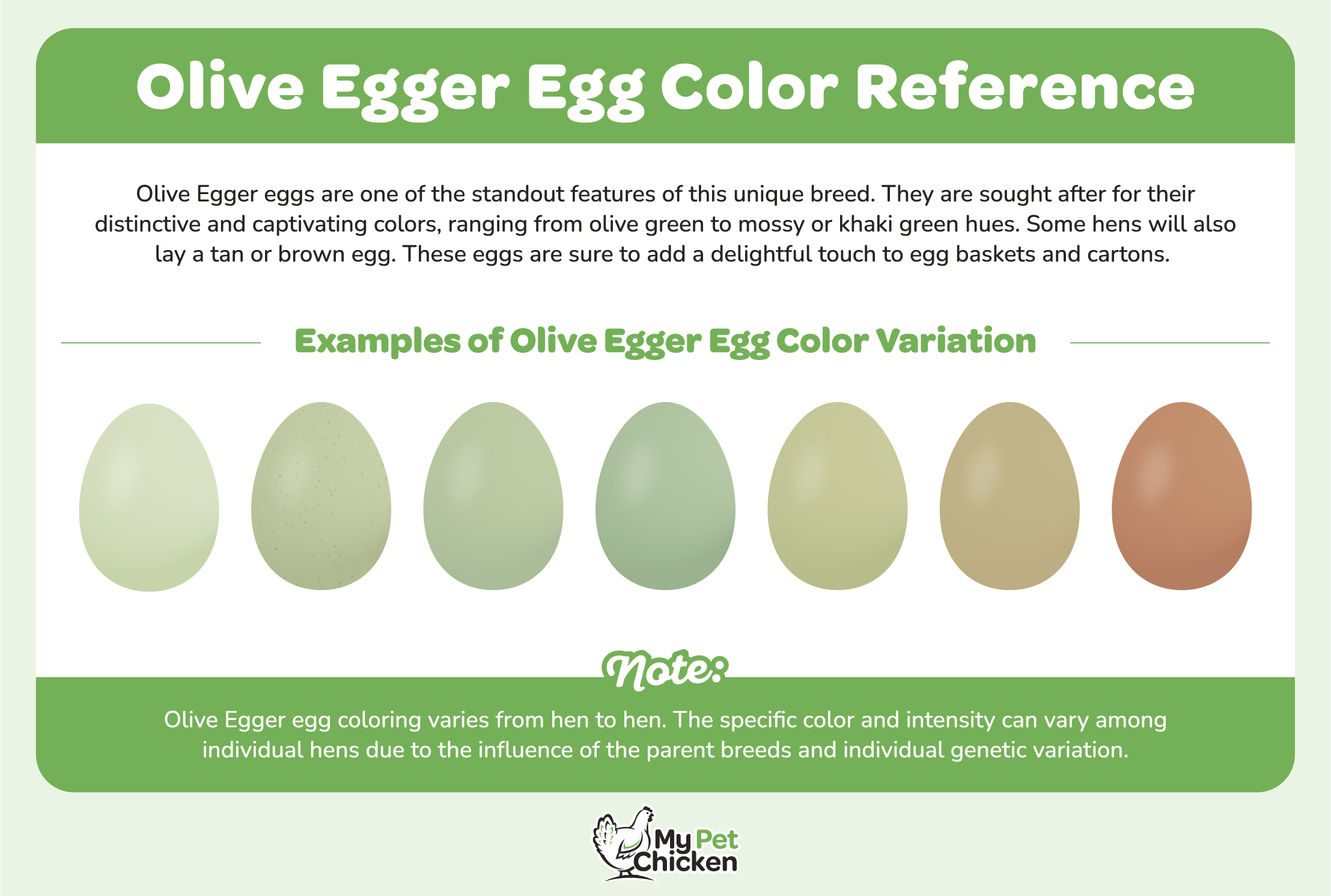
Egg color and production of Olive Egger chickens
Olive Egger chicken eggs are one of the standout features of this unique breed. They are sought after for their distinctive and captivating colors, ranging from olive green to mossy or khaki green hues. Some hens will also lay a tan or brown egg. These eggs can add a delightful touch to your egg basket or kitchen.
It's important to note that not all Olive Eggers will lay the exact same shade of green eggs. The specific color and intensity can vary among individual hens due to the influence of the parent breeds and individual genetic variation. Egg colors of Olive Eggers range from dark olive green to lighter shades or khaki.
In terms of size, Olive Egger eggs are generally medium to large in size, similar to eggs from the parent breeds involved in their crossbreeding. They typically have a similar shape and appearance to regular chicken eggs.
In terms of egg production, Olive Eggers are good layers and can produce around 150-200 eggs per year. This can vary depending on factors such as their diet and environment. They typically start laying eggs at around 5-6 months of age and continue to lay consistently.
Care and health for Olive Egger chickens
Olive Egger chickens are hardy do well in cold climates. They can also live in warmer climates with additional hydration and shade. With proper care and attention, they can live healthy and productive lives, laying colorful and abundant eggs for years to come. The average life span of this chicken breed is 5-8 years.
Do you have any Olive Egger chickens in your flock? Share with us in the comments below.
Ready to grow your flock? Discover all our day-old baby chicks and choose your perfect match.
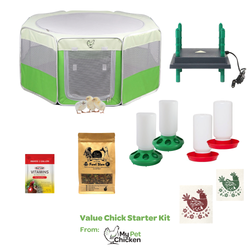
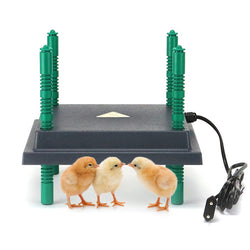

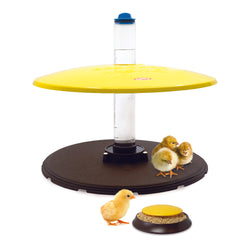
11 comments
Some of the info on Olive Eggers, between this guide, their entry on the Chicken Breed List, and their product listings are conflicting. For instance, the graphic at the top of this guide says they aren’t known for going broody, and that they are heat hardy. But their Chicken Breed List entry says they tend to go broody and are not heat tolerant. The product pages for the various day old chick varieties vary, listing some as broody, some as not, some as heat tolerant and some as not. Which is accurate?
We live on the coast in west central FL and are restarting our flock after Army orders sent us away 8 years ago and we could not take ours with us. We do tend to stay a couple degrees cooler than further inland because of this, but it’s still FL. We experience long stretches in the upper 90’s with extreme humidity during summer. I don’t want to end up with any chickens that will struggle unnecessarily in such extreme heat
I would tend to think the individual listings are most accurate, as a variety of different parent breeds are mentioned between different varieties (including Marans, Araucanas, Ameraucanas, and Welsummers in various places) and so it would follow that the resulting chicks, especially F1s, would carry the traits of the parent breeds and Marans are not known for being a heat tolerant breed (although there is a hatchery here in FL that breeds BC Marans and Dark Brahmas, as well as Olive Eggers, and they seem to do fine). But some confirmation/clarification would be appreciated.
We previously had Barred Rocks, Buff Orpingtons, and RIRs. We loved our Rocks and Orpingtons (including an accidental roo who fathered several fantastic chicks) and will definitely be adding them to our new flock, but I am wanting to take the opportunity to add some color to our egg basket and am hoping that, along with some EEs and other colored-eggers, there is an OE variety that will work for us.
———
My Pet Chicken replied:
Thank you for the opportunity to clarify! When referring to cold or heat hardiness, key factors include feather density, body size, and comb type. Olive Eggers can come in many variations of feather densities and combs, so in we list them as non heat hardy to err on the side of caution. That said, they will do fine in most climates! Buff Opringtons are not considered “heat hardy” as they are very heavy bodied hens but they will also do fine if given adequate shade and lots of fresh water.
If you are hoping to add some color to your egg basket, we recommend the traditional Easter Egger! These are both cold and heat hardy and will lay, on average, 4 blue to green tinted eggs per week. If you are looking for another great option to get those beautiful darker green eggs, we would love for you to take a look at the cold and heat hardy Gold Kissed Granite Olive Egger <https://www.mypetchicken.com/products/baby-chicks-gold-kissed-granite-olive-egger> !
We also have a beautiful cream tinted egg layer (5 to 6 a week!) and she is both heat and cold hardy; the Ameribella <https://www.mypetchicken.com/products/baby-chicks-ameribella> will not disappoint and a creamy colored egg looks beautiful among brown and colored eggs!
We have just started building our flaw. Currently, we adopted 12 Olive eggers. They were three days old. We bought them from TSC . What beautiful chicks!!! I am looking forward to the adventure of watching them grow and the ability to spoil them rotten
———
My Pet Chicken:
Congratulations on your new Olive Eggers! They are such a fun, friendly breed, and those green eggs are always a treat! It’s so special to raise them from just a few days old — you’ll love watching their personalities blossom.
We’re here if you ever need support, tips, or just want to share how your feathered crew is doing. Wishing you all the best as your flock grows (and gets thoroughly spoiled)!
I have 1 week old live eggers. They are super friendly. I notice they are much bigger than the others in the flock. They are super friendly and need a lot of attention. It’s okay I fall for it. I love them they are special!
———
My Pet Chicken:
It sounds like your Olive Eggers are already stealing hearts—and the spotlight! They really do have a way of standing out, both in size and personality. It’s amazing how friendly and engaging they can be even at just a week old. You’re absolutely right—they are special! We’re so glad you’re enjoying your time with them, and it sounds like they’ve found the perfect home. Keep us posted as they grow—we’d love to hear more about your flock
I wanted chickens so I went to TSC and they had Olive Egger chicks. I came home with four baby hens. I loved watching them grow up and at this writing only about 3 months old. I love watching them and they are very friendly and well, now spoiled rotten! Mine are the brown type offeathering with white markings. beautiful hens. IT’s been in the 90’s here and so far have been doing well. I’m excited to have them and they have been a great form of therapy for me, I suffer from depression.
I have seven chickens about 10 months old, one gave olive eggs for a month before the cold weather. Now she seems unhappy and is pecked at by the flock, she’s scared of them and not allowed to share food and water. Her comb is dull and pale. We have snow and approx 11-20*f temps so they stay in their coup/ shed 24/7 right now, can’t wait til they get outside. Any suggestions ?